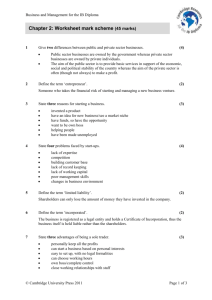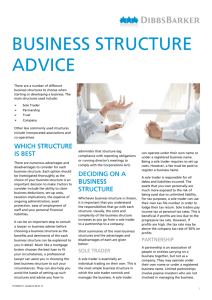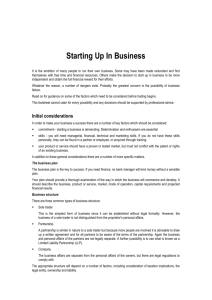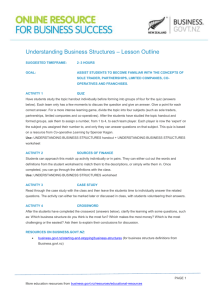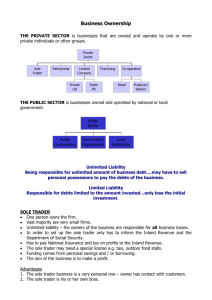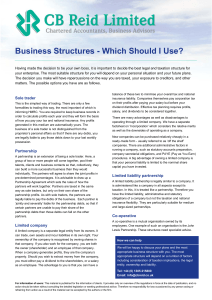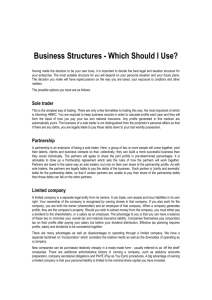PRAC MMENT_Should you incorporate or remain
advertisement
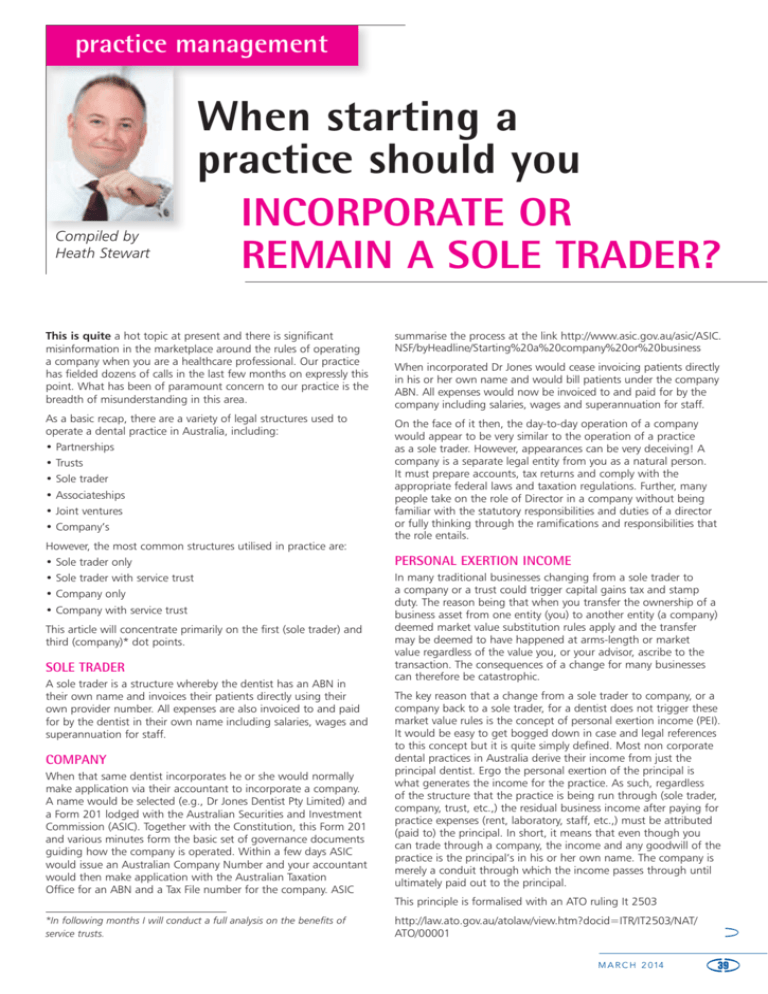
practice management When starting a practice should you Compiled by Heath Stewart INCORPORATE OR REMAIN A SOLE TRADER? This is quite a hot topic at present and there is significant misinformation in the marketplace around the rules of operating a company when you are a healthcare professional. Our practice has fielded dozens of calls in the last few months on expressly this point. What has been of paramount concern to our practice is the breadth of misunderstanding in this area. summarise the process at the link http://www.asic.gov.au/asic/ASIC. NSF/byHeadline/Starting%20a%20company%20or%20business As a basic recap, there are a variety of legal structures used to operate a dental practice in Australia, including: On the face of it then, the day-to-day operation of a company would appear to be very similar to the operation of a practice as a sole trader. However, appearances can be very deceiving! A company is a separate legal entity from you as a natural person. It must prepare accounts, tax returns and comply with the appropriate federal laws and taxation regulations. Further, many people take on the role of Director in a company without being familiar with the statutory responsibilities and duties of a director or fully thinking through the ramifications and responsibilities that the role entails. • Partnerships • Trusts • Sole trader • Associateships • Joint ventures • Company’s However, the most common structures utilised in practice are: When incorporated Dr Jones would cease invoicing patients directly in his or her own name and would bill patients under the company ABN. All expenses would now be invoiced to and paid for by the company including salaries, wages and superannuation for staff. • Sole trader only PERSONAL EXERTION INCOME • Sole trader with service trust In many traditional businesses changing from a sole trader to a company or a trust could trigger capital gains tax and stamp duty. The reason being that when you transfer the ownership of a business asset from one entity (you) to another entity (a company) deemed market value substitution rules apply and the transfer may be deemed to have happened at arms-length or market value regardless of the value you, or your advisor, ascribe to the transaction. The consequences of a change for many businesses can therefore be catastrophic. • Company only • Company with service trust This article will concentrate primarily on the first (sole trader) and third (company)* dot points. SOLE TRADER A sole trader is a structure whereby the dentist has an ABN in their own name and invoices their patients directly using their own provider number. All expenses are also invoiced to and paid for by the dentist in their own name including salaries, wages and superannuation for staff. COMPANY When that same dentist incorporates he or she would normally make application via their accountant to incorporate a company. A name would be selected (e.g., Dr Jones Dentist Pty Limited) and a Form 201 lodged with the Australian Securities and Investment Commission (ASIC). Together with the Constitution, this Form 201 and various minutes form the basic set of governance documents guiding how the company is operated. Within a few days ASIC would issue an Australian Company Number and your accountant would then make application with the Australian Taxation Office for an ABN and a Tax File number for the company. ASIC *In following months I will conduct a full analysis on the benefits of service trusts. The key reason that a change from a sole trader to company, or a company back to a sole trader, for a dentist does not trigger these market value rules is the concept of personal exertion income (PEI). It would be easy to get bogged down in case and legal references to this concept but it is quite simply defined. Most non corporate dental practices in Australia derive their income from just the principal dentist. Ergo the personal exertion of the principal is what generates the income for the practice. As such, regardless of the structure that the practice is being run through (sole trader, company, trust, etc.,) the residual business income after paying for practice expenses (rent, laboratory, staff, etc.,) must be attributed (paid to) the principal. In short, it means that even though you can trade through a company, the income and any goodwill of the practice is the principal’s in his or her own name. The company is merely a conduit through which the income passes through until ultimately paid out to the principal. This principle is formalised with an ATO ruling It 2503 http://law.ato.gov.au/atolaw/view.htm?docid=ITR/IT2503/NAT/ ATO/00001 M A R C H 2 014 39 practice management WHEN IS INCOME NOT PERSONAL EXERTION INCOME? When all income is earned by the practice principal, it is likely PEI. When most of the income is earned by associates, hygienists, nursing staff, sale of goods and or products and others, the character of the income has likely changed from PEI to general business income. PERSONAL SERVICES INCOME A term many younger dentists may have heard is personal services income or PSI. The legislation in this area is covered in Division 84 of the ITAA 1997. One specific area often quoted is the 80/20 rule or the unrelated clients test. I often get questions from dentists who are potential clients, often working as associates asking the following question: “I work as an associate in three practices so I pass the 80/20 rule, so why should I pay any of the profit out of my company? The company only pays 30% tax whilst I may pay tax in my own name at 46.5%” “...you should have a prudential review of business structures every few years, just to make sure it’s optimal.” I should also add we are often asked another question very similar: • There are significant advantages for the sole trader in terms of cash flow to not use a company “I have my own practice in Sydney, I pass the un-related clients test, why should I pay any of the profit out of my company? The company only pays 30% tax whilst I may pay tax in my own name at 46.5%” • A company is required to withhold superannuation and PAYG from the attributed income it pays to the principal, a young dentist may have no interest The misconception in the market place is that if you pass the PSI tests you can also retain profits in a company and not pay out the profits to yourself at the end of the year. Unfortunately, this interpretation is incorrect. Ultimately, all the PSI tests do is determine if your operation is a business or not. The PSI tests do not allow you to retain profits in a company. • Limited liability is not the advantage it used to be and most risks can be insured SO WHY USE A COMPANY? Historically, there was always one compelling reason to incorporate your practice and that was superannuation. For decades when a self-employed sole trader made a contribution to superannuation in their own name they only received a tax deduction for 75% of the contributions after a small threshold. When trying to maximise superannuation balances a company was a good solution as a company received in a 100% deduction for the contributions made on behalf of the principal. Additional reasons to still use a company include: • If you do not provide as per the 4th point you risk penalties and fines • It is cheaper to run a sole trader structure than a company WHAT SHOULD YOU DO IF YOU ARE USING A COMPANY NOW? It is recommended that you review the financial accounts of your company to see if you are attributing all profit of the business back to yourself. If you aren’t, don’t panic, just engage with your accountant and get the full picture as there may be a variety of reasons that profits were retained. You should also revisit if a service trust and or dropping back to a sole trader is appropriate for your practice. Just as the treatment plan for patients changes and develops over time, you should have a prudential review of business structures every few years, just to make sure it’s optimal. • Limited liability – which can protect you against some litigation – although not malpractice which is always personal. • A good traditional solid structure – most people understand how they work. • Ability to stagger tax payments on your salary every month which can help with cash flow. • Some asset protection benefits. • You have a large practice with many dentists working for you and as such you can retain profits as the income is not personal exertion income. WHY NOT TO USE A COMPANY Notwithstanding traditional wisdom and some asset protection benefits, companies don’t provide the solutions they used to for sole practitioners. Further they often don’t provide the solutions to larger practices. The disadvantages are summarised as follows: • Rarely can you retain profits (regardless of advice many have received to the contrary) • Trading trusts or service trusts usually provide a better solution with better flexibility 40 M A R C H 2 014 Heath Stewart is a Partner of Ecovis Clark Jacobs, Accounting and Business Advisers, specialising in providing advice to dentists. Advice includes planning for your financial wellbeing, superannuation, insurance, practice management, computer software and the buying and selling of dental practices. For a free assessment of your financial position and to see how you can achieve your goals, please do not hesitate to contact Heath on 02 9264 1111. This article is designed to provide generic information only and should not be viewed as a recommendation to act. Individuals should seek advice from a qualified adviser to ensure their actions are commensurate with their financial needs and requirements.

